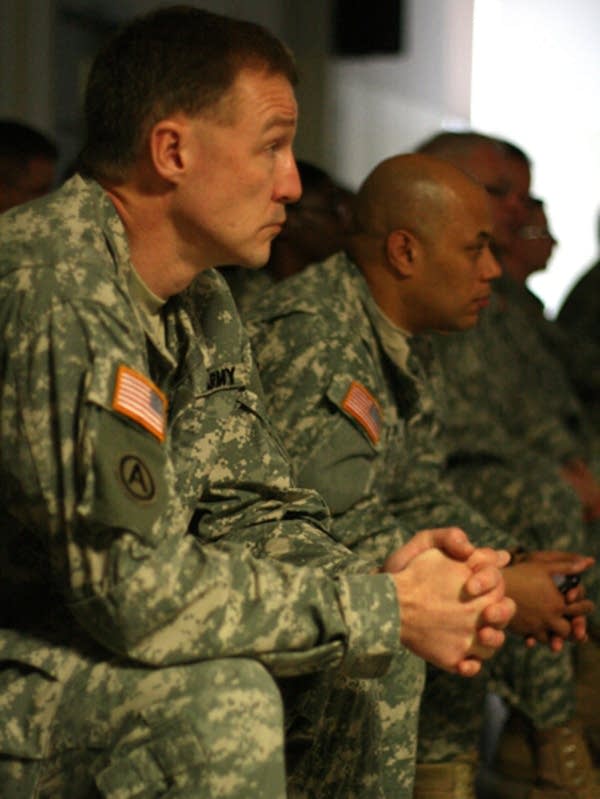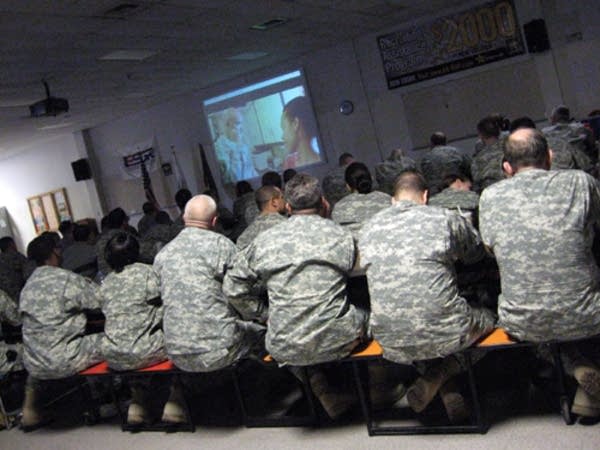Army responds to record number of suicides

It's 0800 hours and the 88th Regional Readiness Command has reported for duty.
"Turn to the person next to you and say, 'Are you thinking of killing yourself?'"
On this morning, there are no push-ups or jumping jacks. No one's learning how to disable a roadside bomb or survive a chemical attack. Instead, the focus is on suicide awareness and prevention.
In 2004, the U.S. Army reported 12 suicides; last year, 143. At this point in 2009, more soldiers have lost their lives to suicide than have been killed in combat.
Create a More Connected Minnesota
MPR News is your trusted resource for the news you need. With your support, MPR News brings accessible, courageous journalism and authentic conversation to everyone - free of paywalls and barriers. Your gift makes a difference.

In light of these numbers, the Army ordered what it calls 'a service-wide stand down', giving suicide prevention training priority over everything else.
"Typically in the military, commanders took care of their soldiers. If somebody got a broken leg, we fixed it. Now we're realizing all of the other things we have to do to help take care of our soldiers," said Lt. Col. Cynthia Rasmussen, a combat stress officer for the U.S. Army Reserve at Fort Snelling.
For years, Rasmussen has been the one soldiers have turned to when they feel like life just isn't worth living.
It's not hard to see how the horrors of war can affect one's well being. What is difficult, says Rasmussen, is getting soldiers to reach out for help when they need it.
"In the military you're trained to be tough. You can't let nobody know you're weak," said Staff Sgt. Charlotte Dubois, who spent a year in Iraq.

When the native of Trinidad and Tobago returned to Minnesota, she struggled to fit back in.
"I felt alone," Dubois said. "When I looked at everybody, I felt more or less like, 'Ok you guys have no idea what we've been through over there.' Everybody is laughing and having a good time. But at the same time you don't want to deal with nobody. There were times I couldn't sleep at night. I would have dreams. I would wake up sweating, just feeling hopeless."
Still, she was afraid that asking for help would ruin her military career.
"I thought they were going to look at my medical records and it was going to make me look like I'm a mental case," Dubois said.
Eventually Dubois sought help at a V.A. hospital, where she was diagnosed with post-traumatic stress syndrome and severe depression. Today the staff sergeant says she's "back to normal." But overcoming the stigma attached with seeking psychological help wasn't easy.
Letting soldiers know it's OK to talk about their traumatic experiences in battle is important, said Lt. Col. Rasmussen, but that only addresses one portion of the problem.
One third of soldiers who kill themselves have yet to be deployed; they've never seen combat.
That statistic has surprised many -- but not Rasmussen.
"What I'm seeing is a lot of the young kids coming in now are missing some of the basic coping skills that you need just to deal with life," she said. "They come from abusive families, chaotic families, that kind of thing. They go to basic training. Then they come home and it's all confusing because what's the most important thing in your life when you're 18? Your friends. You leave for six months, what happens with your friends? They all find new friends."
Trying to deal with the loss of your support system isn't easy when you don't have any coping skills to start with.

This isn't the Army's first attempt at suicide prevention training. But what's different this time around is that preventing suicide is now a compulsory part of the military mission - just like protecting security points and fighting insurgents.
All soldiers are required to ask others in their unit how they're doing and it's their responsibility to alert leaders when they think something is wrong with a fellow soldier.
This kind of systematic tactic of caring for others may seem forced to the average civilian. But Rasmussen is convinced it's the only approach that will work in an organization she describes as "paternalistic". "If you think about it, we're used to being told what to do. We pretty much look the same, we think the same, we act the same because we are told to. It sounds kind of weird, but unless you're in the military or wear the uniform, (you) don't understand that that's how we function. So we really do need from the top down, permission to change the way we interact and care for each other," Rasmussen said.
The way Rasmussen puts it, the Army may not be able to stop war. But it can certainly do a better job of helping soldiers move on from it. She's hopeful this new initiative will do that.


